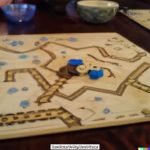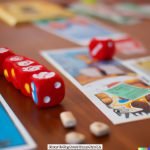History of Board Games
Originating in ancient Babylon, board games have been used to pass down values and stories from generation to generation. Evidence of early boards was found in the Royal Tombs at Ur in Iraq where they were made out of stone and wood dating back to 4500 BC. As the years passed, different civilizations around the world began making their own versions of board games such as Go and Chess. Archaeologists have uncovered primitive mancala-style game boards all over Europe, Asia, and Africa.
As technology improved, so did game production increasing both the quality and variety of games available. In the Victorian era, traditional parlor game nights became popular amongst the aristocrats while simpler family-focused boards like Checkers or Snakes & Ladders continued to be enjoyed by poorer classes. The invention of photography also inspired a rise in picture puzzles which provided an exciting way for families to test their wits during idle times.
With the emergence of modern board gaming in 1960s Germany, it’s fair to say that people haven’t looked back since; new types of games like Blokus or Carcassonne brought another layer of complexity to traditional gaming with innovative rulesets and stunning 3D components transforming them into works of art. As advancements in technology continue, we can expect even more unique styles and genres that will intrigue experienced veterans and newcomers alike!
DIY Board Games
DIY board games offer instructions and advice for people interested in making their own board games at home. This provides an opportunity to save money, especially when compared to the cost of buying pre-made board games. Additionally, it allows readers to customize the game according to their preference and interest. Instructions can be found online and in books covering how to make traditional board games as well as more unique ones such as creating a hybrid between two existing games or fabricating an entirely original game. Information is available on using any materials from cardstock and glue sticks to 3D printing models for pieces and sculpting terrain for miniature wargames. Sources include detailed tutorials on everything from parts sourcing, assembly techniques, painting miniatures, through to rules writing and play testing. This ensures readers have access to all the information they need in order to create high-quality board games that they can be proud of.
Keeping Track of Board Game Scores
Board games can sometimes be long and complicated, making it difficult to remember who is winning or how many points each player has. That’s why good board game players know how important it is to keep track of scores. Here are some tips and advice on best practices for doing so:
1. Have a designated scorekeeper: For most board games, one person should take the responsibility of being the main scorekeeper. This ensures that all scores are accurately tracked, double-checked when needed, and easily referred back to throughout the game.
2. Use an erasable surface: Whether paper or a whiteboard, having an easy-to-erase surface keeps players from having to do too much extra work fiddling around with erasers or starting completely over if mistakes occur during the game.
3. Utilize counters: Counters, such as coins or beads, can be used to effectively mark where a player is on certain scoresheets as opposed to using intricate numbers or formulas which can add more time onto the gameplay experience. Additionally, it’s easier to comprehend visually how many points each individual has in comparison to others playing!
4. Document additional information: Keeping track of scores is important but some games may require additional information that just isn’t feasible to remember offhand especially when multiple turns have already been taken. Make sure you document any important acquisitions or lost privileges throughout the session that could result in major changes in score plaining out ahead of time!
Finding Board Game Accessories
Board game accessories are an integral part of board games. These pieces can add an element of fun and increase the challenge level to a game. Accessories, such as dice and score keepers, provide an additional layer to the game, while other pieces like tokens or figurines can help to enhance the overall gaming experience. Not only do board game accessories create more entertaining gameplay, but some of them even serve as educational tools that can be enjoyed by everyone.
When it comes to finding board game accessories, there are numerous online stores that offer a wide variety of products for gamers of all ages. With websites like Amazon, Target, and Ebay readily available for shopping, it has become easier than ever to purchase these incredible items from the comfort of your home. Many retailers also offer premium pieces from well-known manufacturers like Dream Forge Games and Hasbro that make great additions to any boardgame collection. Additionally, local game shops often host a variety of card night and tabletop gaming events where players can purchase unique one-of-a-kind items not found anywhere else. Whether you’re looking for a classic set or something more modern, rest assured you won’t run out of options when searching for quality board game accessories.
Strategies for Board Game Success
Analyzing the Situation: One of the most important strategies in board games is to analyze the situation. Players should take time to observe what other players are doing and identify which strategies they can use to increase their own odds of success. This involves evaluating past moves, potential moves and possible future actions. Oftentimes a player’s success or failure can be determined by recognizing patterns or trends throughout the game.
Developing Strategies: Before making any moves within a board game, it is important to develop strategies in order to maximize one’s chance of success. This requires examining all available options and weighing each move against its likely outcome. Players should also consider how best to distribute their resources and how other players might react if faced with specific decisions. Being aware of different strategies that opponents may use will also help with devising an effective plan of action.
Making Tough Decisions: One key skill for succeeding at board games is the ability to make tough decisions when necessary. This requires being able to anticipate other player’s reactions, weigh all possibilities and commit to a course of action despite the potential risks involved. Facing difficult decisions is part of nearly every game, so it’s important for a player’s strategy-making process them take this into account.

I love playing all kinds of games – from classics like Monopoly to modern favourites like Ticket to Ride.
I created this blog as a way to share my love of board games with others, and provide information on the latest releases and news in the industry.





